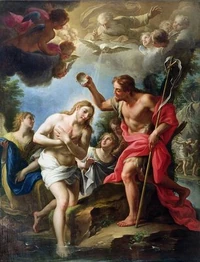| John the Baptist | |
|---|---|
| John the Baptist baptizing Christ by Francesco Trevisani | |
| Forerunner, Precursor, Baptist, Martyr | |
| Born | c. 6–2 BC |
| Died | c. 36 AD |
| Venerated in | Roman Catholic Church, Eastern Orthodox Church, Eastern Catholic Churches, Oriental Orthodox Churches, Anglicanism, Lutheranism, Islam, Mandaeanism |
| Major shrine | Church of St. John the Baptist, Jerusalem |
| Feast | June 24 (Nativity), August 29 (Beheading), January 7 (Synaxis, Eastern Orthodox), Thout 2 ( Coptic Orthodox Church) |
| Attributes | Cross, sheep, camel-skin robe |
| Patronage | patron saint of French Canada, Newfoundland, Puerto Rico, Knights Hospitaller of Jerusalem, Florence, Turin, Porto, Genoa, Jordan, Xewkija and many other places |
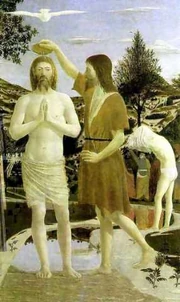
The Baptism of Christ, by Piero della Francesca, 1449
John the Baptist (also called John the Baptizer) is a prophet of three religions: Christianity, Islam, and Mandaeanism. According to the Gospel of Luke 1:36 (And behold, thy cousin Elisabeth, she hath also conceived a son in her old age: and this is the sixth month with her, who was called barren) (KJV), he was a relative of Jesus. That he was a prophet is asserted by the Synoptic Gospels and the Qur'an. He is also commonly referred to as John the Forerunner/Precursor because he was the forerunner of Christ (Tiphshut). Isaiah 40:3-5 is commonly read as a prophecy of John. In later times it was rumored that the Knights Templar also had possesion of the head of St. John. According to Luke 3:1, John began his ministry in the 15th year of the reign of Tiberius, which would have been the year 28 or 29.[1]
John the Baptist in the New Testament[]
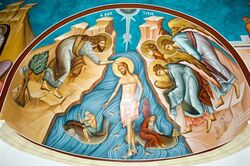
Mural depiction of Jesus' baptism by the hand of John, Jordan River, Jordan
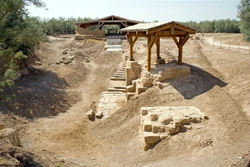
The excavated remains of the baptism site in "Bethany beyond the Jordan"
Birth, name and office foretold to Zacharias[]
- Main article: Zacharias
John the Baptist is the forerunner of the Lord Jesus Christ, and son of Zacharias and Elisabeth, was born about six months before Jesus Christ. His birth, name and office for foretold to his father Zacharias, when he was performing his functions as a priest in the temple of Jerusalem. Zacharias was a priest of the course of Abia (1 Chr. 24:10), and his mother, Elisabeth, was of the Daughters of Aaron (Luke 1:5). Because of this descent, John held the priesthood of Aaron, giving him the authority to perform baptisms of God.
Early years[]
His birth took place six months before that of Jesus, and according to the Gospel account was expected by prophecy (Matt. 3:3; Isa. 40:3; Mal. 3:1) and foretold by an angel. Zacharias lost his power of speech because of his unbelief over the birth of his son, and had it restored on the occasion of John's circumcision (Luke 1:64).
John was a Nazarite from his birth (Luke 1:15; Num. 6:1-12). He spent his early years in the mountainous tract of Judea lying between Jerusalem and the Dead Sea (Matt. 3:1-12). He led a simple life, wearing rope (gamla) fiber clothing and eating "locusts and wild honey" (Matt. 3:4).
Chrysostom and Jerome believe that John was brought up form his infancy in the wilderness, where he abode without eating or drinking little and things of a plain kind, as Jesus says (Gospel of Matthew 11:18), and being clothed only with camel's hair and a leathern girdle about his loins (Matthew 3:4).
Public ministry[]
When he had arrived at thirty years of age, God manifested him to the world, in the fifteenth year of Tiberius, A.D. 28, and he began his ministry, by publishing the approach of the Messiah, in the country along and beyond Jordan, preaching repentance and turning away from selfish pursuits. He induced many persons to confess their sins, whom he baptized in the river Jordan, exhorting them to believe in him who was coming after him; and who would baptize with the Holy Ghost and with fire. He denounced the Sadducees and Pharisees as a "generation of vipers," and warned them not to assume their heritage gave them special privilege (Luke 3:8). He warned tax collectors and soldiers against extortion and plunder. His doctrine and manner of life stirred interest, bringing people from all parts to see him on the banks of the Jordan River. There he baptized thousands unto repentance (see AEnon).
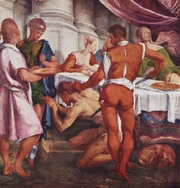
The beheading of John the Baptist, by Jacopo da Ponte
Many persons became his disciples exercising themselves in acts of repentance and urging it on others. When Jesus presented himself to receive baptism from him, John excused himself, saying "I need rather being baptized by you", but Jesus declaring that it became them to fulfil all righteousness, John complied. This was A.D. 30. The next day, John publicly announced Jesus, as the Lamb of God, that takes away the sins of the world (Gospel of John 1:19-29). John's special office as forerunner ended with the baptism of Jesus, who must now "increase" as the King come to his kingdom. He continued, however, for a while to bear testimony to the Messiahship of Jesus.
Imprisonment and the killing of John[]
His public ministry was suddenly (after about six months probably) brought to a close by his being cast into prison by Herod, whom he had reproved for the sin of having taken to himself the wife of his brother Philip (Luke 3:19). He was shut up in the castle of Machaerus, a fortress on the southern extremity of Peraea, 9 miles east of the Dead Sea, and here he was beheaded at the instigation of Herodias. This is about the end of A.D. 31 or early A.D. 32. His disciples, having consigned the headless body to the grave, went and told Jesus all that had occurred (Matt. 14:3-12). John's death occurred apparently just before the third Passover of Jesus' ministry.
The Gospels do not say where John was buried; but in the time of Julian the Apostate, his tomb was shown at Samaria, where the inhabitants opened it and burnt part of his bones; the rest were saved by some Christians, who carried them to an abbot of Jerusalem, named Philip.
Eccl. lib. iii. cap. 3 Chronic. Alex, p.686)
Testimony of Jesus[]
Jesus himself testified regarding John that he was "burning and a shining light" or "a lamp that gave a lot of light, and you were glad to enjoy his light for a while." (John 5:35).
Josephus[]

Eastern Orthodox icon John the Baptist - the Angel of Desert (1620s).
Flavius Josephus in Jewish Antiquities book 18, chapter 5, paragraph 2 records the following:
- Now some of the Jews thought that the destruction of Herod's army came from God, and that very justly, as a punishment of what he did against John, that was called the Baptist: for Herod slew him, who was a good man, and commanded the Jews to exercise virtue, both as to righteousness towards one another, and piety towards God, and so to come to baptism; for that the washing [with water] would be acceptable to him, if they made use of it, not in order to the putting away [or the remission] of some sins [only], but for the purification of the body; supposing still that the soul was thoroughly purified beforehand by righteousness. Now when [many] others came in crowds about him, for they were very greatly moved [or pleased] by hearing his words, Herod, who feared lest the great influence John had over the people might put it into his power and inclination to raise a rebellion, (for they seemed ready to do any thing he should advise,) thought it best, by putting him to death, to prevent any mischief he might cause, and not bring himself into difficulties, by sparing a man who might make him repent of it when it would be too late. Accordingly he was sent a prisoner, out of Herod's suspicious temper, to Macherus, the castle I before mentioned, and was there put to death. Now the Jews had an opinion that the destruction of this army was sent as a punishment upon Herod, and a mark of God's displeasure to him. (Whiston Translation) [2]
From the context, it would seem that in Josephus's account John was executed around 36 AD. Divergences between Josephus's presentation and the Biblical account of John include the following:
- John's Baptism is not for the repentence of sins, as opposed to Mark 1:4.
- John is executed to prevent "mischief," rather than to please Herod's wife's daughter.
- Jesus is not mentioned in relation to the Baptist.
Josephus's passage is quoted by Origen in Contra Celsum in the early third century, and again by Eusebius of Caesarea in the fourth century.
John the Baptist in Eastern Orthodox Church[]
The Eastern Orthodox believe that John was the last of the Old Testament prophets, thus serving as a bridge figure between that period of revelation and Jesus. They also embrace a tradition that, following his death, John descended into Hell and there once more preached that Jesus the Messiah was coming.
The Eastern Orthodox Church remembers Saint John the Forerunner on six separate feast days, listed here in order of the church year which begins on September 1:
- September 23 - Conception of St. John the Forerunner
- January 7 - The Commemoration of St. John the Forerunner (main feast day, immediately after Epiphany on January 6)
- February 24 - First and Second Finding of the Head of St. John the Forerunner
- May 25 - Third Finding of the Head of St. John the Forerunner
- June 24 - Birth of St. John the Forerunner
- August 29 - The Beheading of St. John the Forerunner
The Roman Catholic Church remembers St. John the Baptists on two separate feast days:
St John's parents are commemorated on the day the Eastern Church celebrates his conception.
- September 23 Zechariah and Elisabeth, parents of St John, the Lord's Precursor.
John the Baptist as a patron saint[]
Saint John the Baptist is the patron saint of French Canada. The Canadian cities of Saint John, New Brunswick and St. John's, Newfoundland were both named in honour of Saint John. His feast day is June 24, celebrated in Quebec as the Fête nationale du Québec. He is also counted as the Patron of the Knights Hospitaller of Jerusalem.
Gnostic view[]
In Gnosticism, John the Baptist was a "personification" of the Old Testament prophet Elijah. According to Gnostic theology, John the Baptist was a Prophet from the Old Testament who did not know the True God (the God of the New Testament), and thus had to be reincarnated. As predicted by the Old Testament prophet Malachi, Elijah must "come first" to herald the coming of Jesus Christ.
See also[]
- Johannite
Places and things named for John the Baptist[]
- Puerto Rico was originally named San Juan Bautista; San Juan is now its capital city.
- St. John's, Newfoundland, was founded on his feast day June 24, 1497.
- Saint John, New Brunswick was named after the Saint John River which was named by Samuel de Champlain
- Prince Edward Island, a Canadian province, was originally called Ile de St. Jean or St. John Island.
- St. John's Wort is named after St. John because it is traditionally harvested on his feast day, June 24.
External links[]
- John the Baptist at Wikimedia Commons
- Catholic Enclopedia on John the Baptist
- Jewish Encyclopedia: John the Baptist
- The Witness of John the Baptist
News archive[]
- Scholar says he's found John the Baptist's cave
- Possible burial locations for John the Baptist, according to Find-A-Grave
This article was forked from Wikipedia on March 26, 2006.
| This page uses Creative Commons Licensed content from Wikipedia (view authors). |
